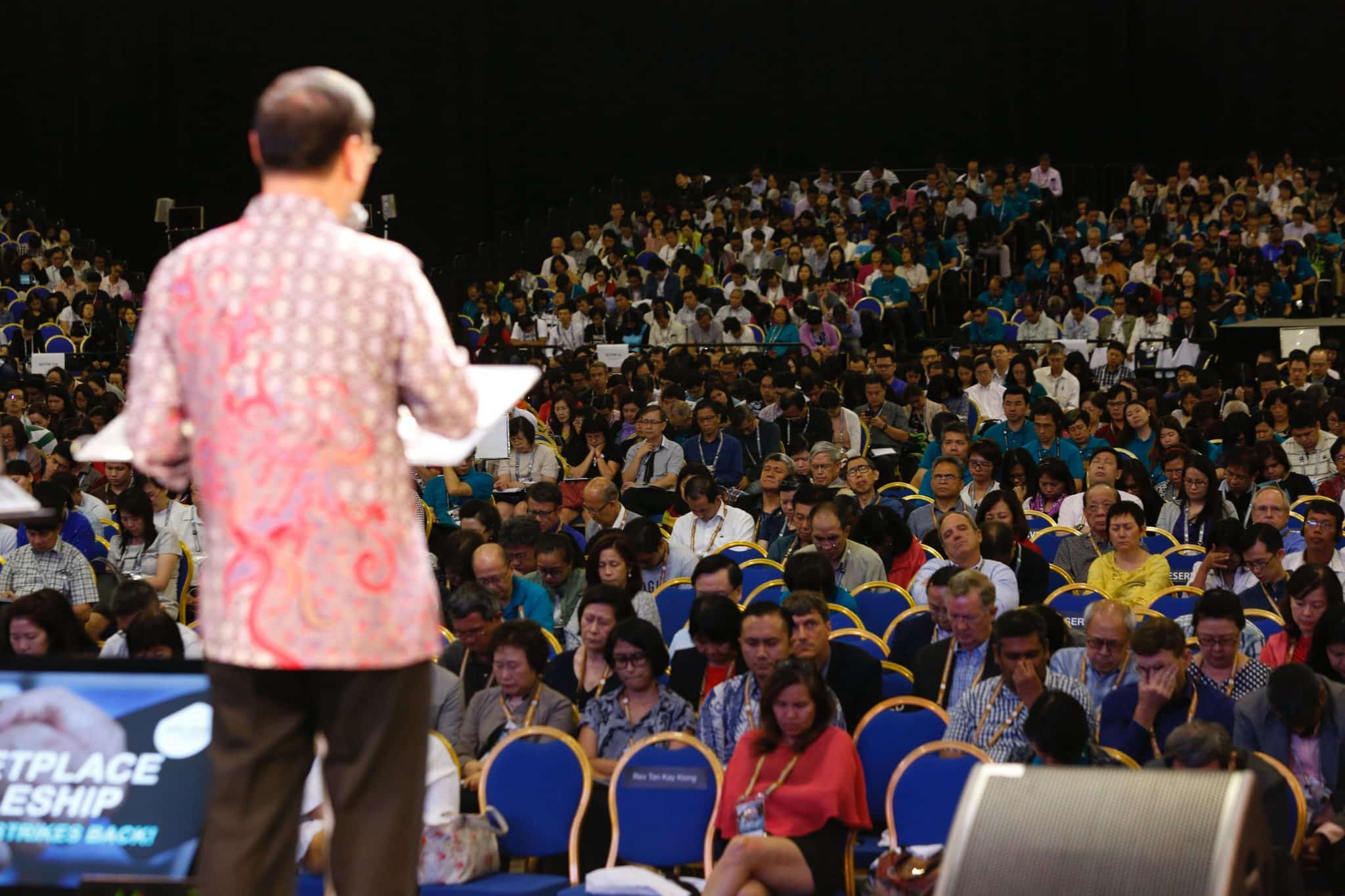“Don’t make it forbidden fruit”: Peter Tan-Chi Jr on how to protect children from gaming addiction
by Christine Leow // October 28, 2020, 4:02 pm

Gaming and technology can be used to educate and create and Peter Tan-Chi Jr has been teaching his three children how to do that. Photo courtesy of Peter Tan-Chi Jr.
His was an idyllic childhood. The eldest child of Reverend Dr Peter Tan-Chi who is the founder and senior pastor of Christ’s Commission Fellowship in the Philippines and his wife Deonna, Peter Tan-Chi Jr grew up in a godly, loving home.
“My parents never lost their temper, I never saw them fight,” said Peter Jr, 45.
Though his father was growing a church that would eventually include 100,000 members and 70 satellites in the Philippines as well as satellite churches and small groups around the world, Peter Senior always prioritised family.

Rev Dr Peter Tan-Chi and his wife Deonna raised their five children to look towards Christ, bringing them along for ministry engagements, exposing them to a higher purpose in life than themselves. Photo from Rev Dr Peter Tan-Chi’s Facebook.
“We always knew that ministry was not more important than us. They spent time with us,” said Peter Jr who is the CFO of AXEIA, one of the leading mass housing and subdivision developers in the Philippines and a company his father started.
“There was nothing we couldn’t talk to my parents about.”
He speaks warmly of regular family dinners and evening walks three times a week when his parents would talk to their five children.
“I was overweight as a kid. I would get tired and complain about those walks but that is an example of the habits they built in our lives.
“They would disciple us during those walks, asking us questions about our lives. There was nothing we couldn’t talk to them about.”

Family was so much fun that Peter Tan-Chi Jr (standing, third from right) never found the need to bow to peer pressure. Here, Peter Jr is seen with his siblings, their spouses and children and his parents (seated, centre). Photo from Rev Dr Peter Tan-Chi’s Facebook.
Dad would also take the kids to the office or on speaking engagements, turning the trips into family holidays.
“We love being together as a family. We didn’t need to hang out with friends. Because family was so strong, peer pressure was not a very strong force. We didn’t need to get our self-worth from other people.”
The lure of the win
Even so, Peter Jr had his wayward years. In his early teens, a friend introduced him to computer games. It was easy for the boy who loved competition and winning to get hooked.
“I would game at night. I still did all my stuff like go to school and complete my work. I wasn’t completely dysfunctional.
“God has a sense of humour. He gave me a woman who hates gaming.”
“So, it was not so obvious at first because I had a room of my own and my computer was in my room. My parents were concerned but they didn’t know how much of my time gaming was consuming.”
The addiction would carry on through to his college years when, “free from their control”, he would forgo sleep to play for six hours in the night. His grades suffered and, as he shared on Zoom chat show Salt&Light Family Night (October 13), he paid a hefty price. He was the only one in his family who did not graduate university with honours despite having been an ‘A’ student before.
At business school – he was admitted into Wharton School, the business school of Ivy League, University of Pennsylvania, on his second try – gaming robbed him of time with friends and he emerged from the experience with few “close connections”.
Even after he got married, gaming continued to have a hold on him and it became a source of tension between him and his wife, Jennifer, 40.
“God has a sense of humour. He gave me a woman who hates gaming.”
The solution of a new heart
What turned him around were the seeds planted in his life by his parents who “always pointed us to Christ”. One day in his 30s, as Peter Jr was reading the Bible, the parable of the tree that bore no fruit and was given a year to do so or be cut down (Luke 13:6-9) spoke to him.
“I let the lies the world feeds you grow in my heart – that this will make me happy.”
“I felt God was telling me, ‘You’ve got to make a change.’”
Unable to stay away for good, Peter Jr told God he would, instead, give up gaming for a year. That year of “detox” when he surrendered his desires to God broke the hold of games over his life.
But, he cautioned, like with any addiction, constant vigilance is necessary. Peter Jr tells of his discovery of mobile phone game Mobile Legends when he was already in his 40s.
He ended up playing for a couple of hours a night for weeks. His wife “got pretty angry” and so he stopped.

Gaming became a source of tension in their marriage but Peter Jr is thankful his wife has been helping him keep his gaming in check. Photo courtesy of Peter Tan-Chi Jr.
“If I start playing tonight, I would still enjoy it. I don’t think I will ever not enjoy gaming. But I have to be very careful. I just have to take breaks or I’d get addicted again.”
“We need a new heart.”
Explaining the importance of getting to the root of the issue to overcome the addiction, Peter Jr said: “My parents were the best parents and I still got into gaming in an unhealthy way.
“The sin in my heart is the same seed as a person who grew up with drugs or alcohol. I am no better.
“I let my desires lead me. I let the lies the world feeds you grow in my heart – that this will make me happy. That’s why we all need a heart transplant. We need a new heart.”
The wisdom from experience
Because of his experience with the world of gaming, Peter Jr is more circumspect as he raises his three children – two daughters aged 10 and six, and a three-year-old son – in this tech-savvy world. He shares his insights into how to equip children to use, not abuse, games and technology.
#1: Know your game
Peter Jr makes it a point to familiarise himself with games his children are interested in or exposed to.
“The more time you invest in it, the more you don’t want to put it down.”
“We were together at someone’s house and my sister’s kids were playing Among Us. I let my daughter play and I played the game with her once. That was my homework.”
Apart from games with violence or dark themes, he warns of opened-ended games as well.
“These are games that are designed to go on forever with no end and are one of the most addictive games because they allow you to keep accumulating things. The rewards from the games persist a long time.
“So, the more time you invest in it, the more you don’t want to put it down because ‘where your treasure is, there your heart will be also’ (Matthew 6:21).”
#2: Use technology, don’t abuse it
Get games and apps that encourage children to create rather than consume. There are art apps that let children create digital art as well as apps that gamify coding so users can learn how to code in a fun a way. There are also media apps that make movie-making easy and apps that help you animate cartoons.
To encourage his children to use educational games and apps, they are made readily available on the children’s devices.
Sharing how his children use technology to create, Peter Jr said: “My older daughter would take pictures with a toy and frame it in such a way that she looked like she was standing next to a giant toy.
“My other daughter would watch videos on how to draw. Both also made a stop motion video on their own. My son uses a reading app on the iPad. There are lots of productive things. You just have to look.”
#3: Don’t make it forbidden fruit
Even if your child is not exposed to games in the house, he would be exposed to them by his friends because games are so prevalent.
“I learnt a lot of my games from kids in school. There was this one guy who kept introducing me to new games. Without him, I would not have gotten into games,” said Peter Jr.
“We look at what they do and not the hours.”
To entirely forbid games would make them forbidden fruit and all the more to be desired. Cutting out all forms of technology and online use is also not practical given the post-COVID world where online classes have become a reality.
“I intentionally expose my children when they are young and I teach them to use technology for productivity and not for pure entertainment.”
After that, it is a matter of setting limits.
“We look at what they do and not the number of hours. So, if they are using technology to create and it takes a longer time, it’s okay.”
#4: Know why they game
Even though he was well brought up and loved, even though he was successful in life, games were still attractive to Peter Jr.
“Look for the hook in the game for him.”
“Games offered an accelerated way for me to achieve. It gave me a way to become a hero quicker, to get the rewards quicker. I get a rush from that. I enjoy winning and I like competition – two elements in gaming.”
That is why knowing why your child games is important because the game may be addressing a need not fully met in real life.
“Look for the hook in the game for him and make sure he gets it in real life as well. My kids play for fun. But they have just as much fun in real life so I know the game will not take over real life.”
If children game because they are bored, that is “really dangerous” because it means they have been so stimulated by games that everything else in life is boring in comparison.
#5: Make real life meaningful and fun
To counter that, make the real world attractive. Peter Jr takes his children swimming thrice a week. His brother takes his children outdoors and has made a rope ladder for them.
“Now I want to get a rope ladder for my kids,” laughed Peter Jr.
Recalling an incident from his teen years, Peter Jr talked about a time when his father stopped him from paying basketball in high school.
“We got to see there was more to life than serving yourself.”
“Years later, my father apologised to me and said he wished he had let me play more because if I had more to do outside, I would not have gotten into gaming so much.
In the same way, children who game with friends are less vulnerable than those who game with strangers.
“Kids who game with friends they know in real life are less likely to get addicted. They game because their friends game.
“But if a kid games because he is lonely and doesn’t have a lot of friends, he’ll never want to put the game down because that is his social network.”
Making real life meaningful also helps steer young hearts away from the inwardness of games.
“My parents would cast their vision of what we should be doing into our lives. They involved us in ministry. We listened to people’s testimonies, saw how they counselled them and shared the Gospel. That left a lasting impression.
“We got to see there was more to life than serving yourself. We always felt that we had a purpose.”
#6: Model the behaviour
Peter Jr firmly believes in walking the talk. “Talking is not as powerful as them seeing it in your lives.”
Parents can tell their children to stay away from their devices but their instructions have little traction if they cannot put their own devices away. So, a family gadget-free time where everyone disconnects from devices to connect with each other is important.
“Play board games, card games, Lego. I know as an adult it can be boring Who wants to play UNO 100 times? But when your child is six, that’s what she wants to play.”
We are an independent, non-profit organisation that relies on the generosity of our readers, such as yourself, to continue serving the kingdom. Every dollar donated goes directly back into our editorial coverage.
Would you consider partnering with us in our kingdom work by supporting us financially, either as a one-off donation, or a recurring pledge?
Support Salt&Light


